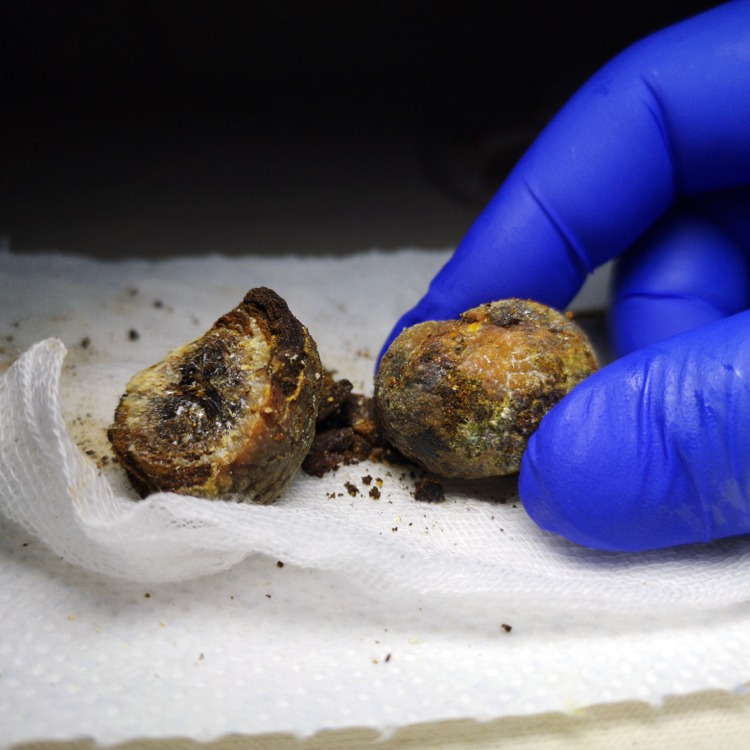
Gallstones
"Everything you need to know about gallstones: Causes, symptoms, treatment and prevention"
1. Introduction
Welcome to this detailed article about gallstones.
Our health is our greatest asset and it is therefore important to be well informed in order to prevent diseases, recognise them early and treat them appropriately.
Today we are focussing on a topic that affects many people but often receives too little attention: gallstones.
In the following sections, you will learn everything you need to know about gallstones - from their development and symptoms to treatment options and prevention.
2. What are gallstones?
First of all, we should clarify what gallstones actually are.
Gallstones are solid deposits that can form in the gallbladder. They form when the composition of bile becomes unbalanced.
bile is a fluid that is produced in the liver and stored in the gallbladder. It plays an important role in the digestion of fats. Gallstones can vary in size. Some are as small as a grain of sand, others can reach the size of a golf ball.
there are different types of gallstones, but the most common are cholesterol stones and pigment stones.
3. Causes for the formation of gallstones
There are various factors that can contribute to the formation of gallstones. One of the main reasons is an unbalanced diet.
A diet high in fat and low in fibre, for example, can promote the formation of cholesterol stones. Obesity and rapid weight loss can also increase the risk of gallstones.
In addition, genetic factors also play a role. If gallstones have already occurred in your family, you are more likely to develop them.
Other risk factors include age, gender and certain diseases such as diabetes or blood disorders.
4. Symptoms and diagnosis of gallstones
Gallstones can go unnoticed for a long time as they often do not cause any symptoms.
However, if a stone blocks the bile duct, this can lead to severe pain in the right upper abdominal region.
This pain is also known as biliary colic and can last for several hours . Other possible symptoms include nausea, vomiting, fever and jaundice.
If you notice such symptoms, you should definitely consult a doctor .
Gallstones are usually diagnosed by an ultrasound examination of the abdomen. In some cases, a computed tomography (CT) scan or a magnetic resonance imaging (MRI) scan may also be necessary .
5. Treatment options for gallstones
The treatment of gallstones depends on the size of the stones and the symptoms.
Small stones that do not cause any symptoms generally do not need to be treated. However, treatment may be necessary for larger stones or severe pain.
One option is to dissolve the stones with medication. However, this can take several months and is not always successful.
Another option is so-called shock wave lithotripsy, in which the stones are crushed using ultrasound waves.
In many cases, however, an operation is necessary in which the gallbladder is removed. This operation is known as a cholecystectomy and is usually a safe and effective procedure.
6. Prevention of gallstones
Fortunately, there are several measures you can take to reduce the risk of developing gallstones.
A healthy and balanced diet is of central importance. Make sure you eat enough fibre and limit your consumption of saturated fats. Regular physical activity can also help to prevent gallstones.
In addition, it is important to maintain a healthy body weight and avoid rapid weight loss. If you have diabetes or a blood disorder, you should keep these conditions well under control to minimise the risk of gallstones.
7. Tips for a healthy gallbladder
In addition to preventing gallstones, there are other steps you can take to keep your gallbladder healthy. Drink plenty of water to keep bile fluid and promote bile flow. Avoid alcoholic drinks and fatty foods, as these can put a strain on the gallbladder. It is also important to eat regularly. Long periods of fasting can lead to bile being stored in the gallbladder for too long and stones can form. Finally, you should have regular health checks to detect any problems at an early stage.
8. Summary and conclusion
In this article, we have taken an in-depth look at the topic of gallstones. We have learnt what gallstones are, how they form and what symptoms they can cause. We have also learnt about different treatment options and how we can prevent gallstones and keep our gallbladder healthy.
It is important to emphasise that good health is often the result of a healthy lifestyle. A balanced diet, regular physical activity and good control of existing diseases are essential to minimise the risk of gallstones.
If you notice symptoms that could indicate gallstones , you should definitely consult a doctor. Your health is worth it !
9. What awaits you in the member area
- Frequency lists for frequency therapy devices
- Mycotherapy in relation to gallstones
- Natural home remedies for gallstones
- Food supplements in relation to prevention
- Therapy plans (frequency therapy for doctors and therapists)
Become a member now
As a member, you will receive further information and frequencies on this topic! Log in here!
